#la carmagnole
Explore tagged Tumblr posts
Text
La Carmagnole!
youtube
17 notes
·
View notes
Text
In honor of Bastille Day, here is the cutest version of La Carmagnole!
youtube
0 notes
Text
But, he was not far off, for presently she heard a troubled movement and a shouting coming along, which filled her with fear. A moment afterwards, and a throng of people came pouring round the corner by the prison wall, in the midst of whom was the wood-sawyer hand in hand with The Vengeance. There could not be fewer than five hundred people, and they were dancing like five thousand demons. There was no other music than their own singing. They danced to the popular Revolution song, keeping a ferocious time that was like a gnashing of teeth in unison. Men and women danced together, women danced together, men danced together, as hazard had brought them together. At first, they were a mere storm of coarse red caps and coarse woollen rags; but, as they filled the place, and stopped to dance about Lucie, some ghastly apparition of a dance-figure gone raving mad arose among them. They advanced, retreated, struck at one another's hands, clutched at one another's head, spun round alone, caught one another and spun round in pairs, until many of them dropped. While those were down, the rest linked hand in hand, and all spun round together: then the ring broke, and in separate rings of two and four they turned and turned until they all stopped at once, began again, struck, clutched, and tore, and then reversed the spin, and all spun round another way. Suddenly they stopped again, paused, struck out the time afresh, formed into lines the width of the public way, and, with their heads low down and their hands high up, swooped screaming off. No fight could have been half so terrible as this dance. It was so emphatically a fallen sport – a something, once innocent, delibered over to all devilry – a healthy pastime changed into a means of angering the blood, bewildering the senses, and steeling the heart. Such grace as was visible in it, made it the uglier, showing how warped and perverted all things good by nature were become. The maidenly bosom bared to this, the pretty almost-child's head thus distracted, the delicate foot mincing in this slough of blood and dirt, were types of the disjoined time.
This was the Carmagnole. As it passed, leaving Lucie frightened and bewildered in the doorway of the wood-sawyer's house, the feathery snow fell as quietly and lay as white and soft, as if it had never been.
— A Tale of Two Cities (Charles Dickens)
#book quotes#historical fiction#charles dickens#a tale of two cities#history#politics#music#music history#singing#songs#dance#french revolution#france#paris#carmagnole#la carmagnole#hysteria#terror#fear#winter#snow#lucie manette
1 note
·
View note
Text
ma petite sœur remplace systématiquement le nom du méchant dans les comptines qu'elle chante à son bébé par "macron" (si la comptine en contient un)
je lui demande en plaisantant à demi ce qu'elle fera si jamais dans quelques mois parmi les premiers mots du bambin il y a macron du coup ? elle répond du tac-au-tac : ben lui apprendre "macron explosion !!"
#upthebaguette#whatthefrance#macron explosion#macron au bouillon#m'est avis qu'elle lui chantera bientôt la carmagnole
30 notes
·
View notes
Text

Today in “The French Revolution is... odd,” let’s delve into the time when the official government policy for dealing with rebellion in the West was... to send musicians to play revolutionary songs at the brigands.
Not shoes. Not food. Not weapons. Musicians.
Yes, you read that correctly. In the Year II, the Committee of Public Safety decided that musicians should be sent to the armies, particularly in Brittany and the Vendée, to stir the soldiers’ courage during battle.
Prieur (de la Marne), who was on mission in the region, fully embraced this idea, which he found utterly splendid. In a sort of proclamation, he told the musicians that, after observing their behaviour and zeal, he would never forget how they had “combined bravery with talent” and that by playing the Carmagnole for the brave Republicans, they were ready to make the brigands "dance to it." (1)
He went on to say: “Continue to electrify souls with masculine songs (2) —songs that inspire courage and love of the homeland. In the ancient republics, music was a central element of education. The French Republic shall not neglect it, and this art is all the more valuable, as those who spark courage will lead by example in their conduct.”
Source: Gustave Laurent , Annales historiques de la Révolution française, 1ère Année, No. 1
Note:
(1) For the sake of historical accuracy, there is no evidence—at least none that I can find—of soldiers from the Catholic armies suddenly breaking into dance mid-battle.
(2) Quote translation: "Because, of course, we wouldn’t want those brigands thinking we’re soft, now would we? Rrrrr, we’re MEN!"
#frev#french revolution#history#la rochejaquelein#vendee war#vendee#prieur#committee of public safety#cps#Henri de la Rochejaquelein
38 notes
·
View notes
Text


Prototype for an armoured, articulated deep sea diving suit - 1882 (Alphonse and Théodore Carmagnolle)
Musée de la Marine, Paris 2024
37 notes
·
View notes
Note
Is It true that Lebon gathered musicians to play music during the executions in Arras?
The the best source mentioning any such thing I’ve got so far is a letter from Armand Joseph Guffroy to Robespierre dated 18 floréal (May 7 1794), published in the former’s Les secrets de Joseph Lebon et de ses complices, released a few months after the fall of latter:
To relax, and to be consistent, you must this evening, or tomorrow at the latest, have Demeulier and his three companions freed from the Madelonnettes, to know for yourself the truth of what is happening in Arras. Listen and remember; these are Patriots oppressed by a Priest, who has been locked up like a madman, and who, when he could no longer be fanatic and superstitious, became a fanatical patriot through avarice, and caused patriotism and virtue to be hated by his extravagant conduct; or should I say, by his atrocious conduct. Know that, placed on the balcony of the comedy, on the fish market, (today Place de la Revolution), with his nose on the guillotine, he spoke with passion about the execution, and he ordered the tune ça ira to be played (il a fait jouer par la musique l’air ça ira). […]
Guffroy was Lebon’s archenemy, so this information should of course be treated with some caution. We know Guffroy was not an eye witness to this (but also that he did have contacts with people that could have been, such as Antoine Buissart and one Solon), that his goal with the letter is to get Robespierre to recall Lebon, increasing the chances he would lay it on thick in describing what he’s been up to (or could it instead be argued he would try to be as truthful as possible in order to get Robespierre to see how bad it really is?) and that stories about representatives on mission taking pleasure in watching the executions take place hardly is something unique for Lebon, and in some cases can be disproven (such as in the case of Collot d’Herbois, who almost certainly did not personally witness the shootings of condemned in Lyon).
Besides that, I found the following two testimonies from possible eye witnesses, both cited within this great blog post. The two are however written both 1, way after the fact, and 2, by people hostile to Lebon, making it hard to rule out the possibility their stories are embellished or even build on what Guffroy wrote in his report (although in the latter case, the part about the music is a very tiny detail among almost 500 pages, so it still seems a bit strange they would all pick exactly that detail to copy):
When any of his colleagues passed through Arras, [Lebon] always proposed their joining with him in a "partie de Guillotine", and the executions were perpetrated on a small square at Arras, rather than the great one, that he, his wife, and relations, might more commodiously enjoy the spectacle from the balcony of the theatre, where they took their coffee, attended by a band of music, which played while his human butchery lasted. A Residence in France during the years 1792, 1793, 1794 and 1795 (1798) by Charlotte Biggs.
Penetrating the crowd, which was thronging in the dark and winding streets, I soon reached the fish-market. Then the first object which struck my sight was the guillotine, raising its blood-red boards above the silent multitude. An old man, whom they had just tied to the fatal plank, was the victim; suddenly I heard the sound of trumpets. On a high place which overlooked the orchestra, was seated a man, still young, clad in a Carmagnole of black and blue stripes. This person, whose appearance announced monastic rather than military habits, was leaning carelessly on a cavalry sabre, the large hilt of which represented the Cap of Liberty; a row of pistols ornamented his girdle, and his hat, turned up in the Spanish fashion, was surmounted by a large tri-coloured cockade: I recognised Joseph Lebon. At this moment his mean countenance was animated with a horrid smile; he paused from beating time with his left foot; the trumpets stopped; he made a signal, and the old man was placed under the blade. A sort of clerk, half drunk, then appeared at the side of the " avenger of the people," and read with a hoarse voice a bulletin of the army of the Rhine and Moselle. At each paragraph the orchestra sounded a chord; and when the reading was concluded, the head of the wretched old man was stricken off amidst shouts of "Vive la republique!" repeated by the satellites of the ferocious Lebon. I shall never forget, nor can I adequately depict the impression of this horrible sight. I reached my father's house almost as lifeless as the miserable being whose agony had been so cruelly prolonged; and then I learnt that he was M. de Mongon, the old commandant of the citadel, condemned as an aristocrat. Memoirs of Eugène Vidocq (1829)
25 notes
·
View notes
Text
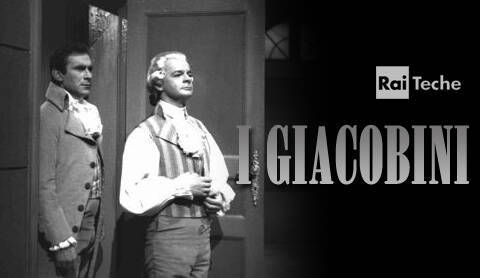
Soo today I decided to look further into whathever happened to the I Giacobini screenplay - buckle in, I did my best to include as much info as I could find!!
"I Giacobini" (the jacobins) is an Italian screenplay from 1962 based on Federico Zardi's homonymous drama and it is, as of today, a lost media.
The cause for the disappearance of the screenplay from the RAI (Italian national public broadcasting company) archives is either reconduced to the lack of care for the preservation of medias at the time or to the theory which believes the cause to be due to political circumstances.
According to Wikipedia (eh):

...while Italy was in the hands of the Democrazia Cristiana, RAI for the first time broadcast to the public a screenplay «practically entirely aligned with the left and in which Robespierre doesn't come off as a bloody monster but rather like a Che Guevara of reason»
The Democrazia Cristiana or DC (Christian Democracy) was a centrist christian democratic political party in Italy.
The screenplay became largely appreciated by the public, as well as receiving praises from Palmiro Togliatti, exponent of the PCI (Italian communist party) - which happens to be one of the DC 's political opponents at the time.

(source)
Palmiro Togliatti on "Rinascita" wrote that television was bringing a change, since «for the first time it brought a representation of the French revolution inside Italian households»
I went ahead and looked through the archives of Rinascita but found this.
Here I found Togliatti's comment on the screenplay - the below image is a section of it:
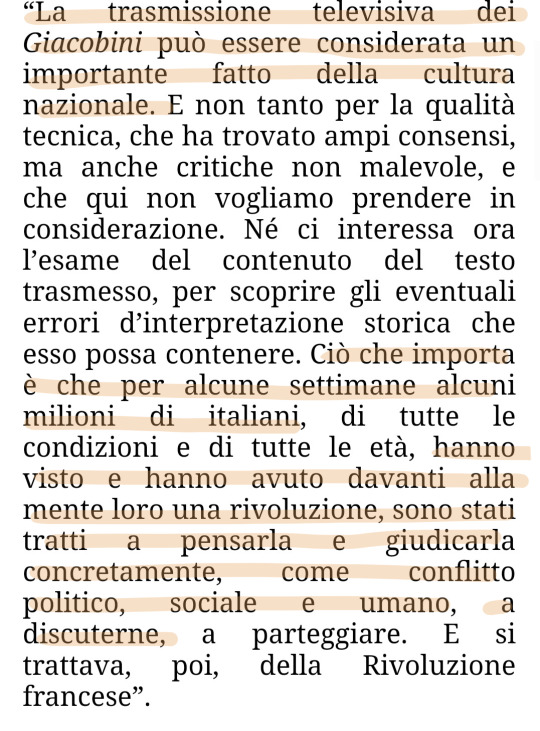
The screenplay I Giacobini can be considered an important event of national culture. [...] What matters is that for some weeks a few billions of Italians, have seen and have had in front of their minds a revolution, have been brought to think about about it and to discuss it, seeing it as a political, social and human conflict.
It's then necessary to understand the political contexts of the time both within and outside of Italy:
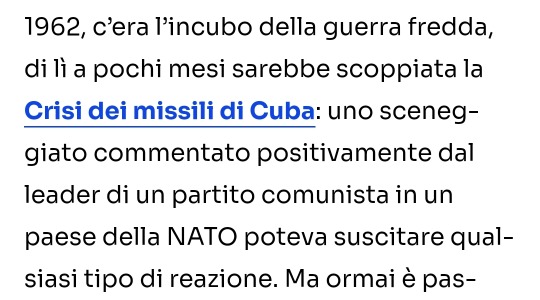
(source)
...In 1962, under the threat of the cold war, a few months before the Cuban Missile Crisis, a screenplay remarked positively by the leader of a communist party in a NATO country could've raised any kind of reaction.
Thus, the mystery surrounding the disappearance of the screenplay is believed to be caused by some archivist involved with the democristian party.
While this is widely believed to be the reasoning behind it there's not much clear evidence and it's likely impossible to investigate since so much time has passed.
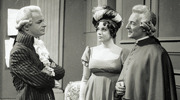
About the screenplay: it was broadcast in 6 episodes, of 90 minutes each, between 11th March - 15th April of 1962 (with a rerun in 1963 after which the tapes disappeared).
It originally featured La Marseillaise, La Carmagnole and Ça ira as well as 4 songs produced for the theater play by Gino Negri.
Audio Recording
In 2012 a man came forward with a (illegally) recorded copy of the audio from the screenplay and sent it over to the Rai archives. The studio managed to recover and digitalize the audios of the six episodes - sadly the video recording is still missing.
Funnily enough, the archive page on which the audios were supposedly made public is gone as of today - but I have found YouTube uploads here: [1] [2] [3] [4] [5] [6]
Also here's a doc that wast broadcast on Italian television on the 11th March of 2012, in honor of the 50 years since the first run of the screenplay - (it's in Italian, if anyone's interested I'll gladly sub it/provide a translation)
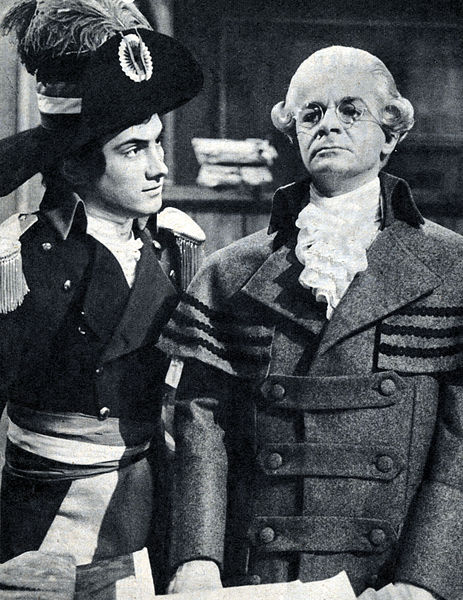
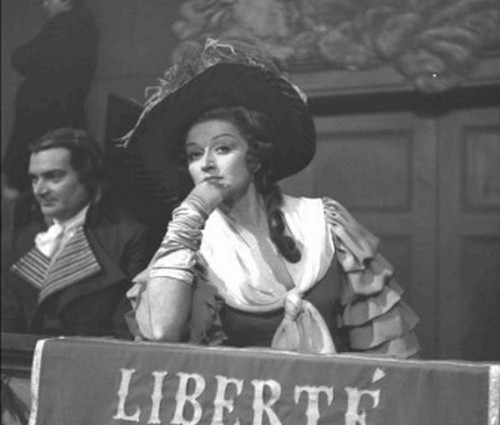
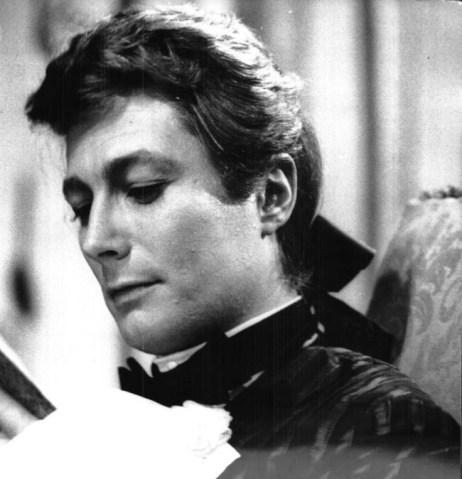
In short - bless that viewer for pirating the audio in 1962 and lots of hate to whoever lost the tapes..
Maybe I Giacobini was the friends we made along the way 🍊
#Hope this is good enough if I find more I'll add to this post :p#french revolution#frev#I giacobini (1962)#I giacobini#Frev lost media
45 notes
·
View notes
Text

MARDI 14 JANVIER 2025 (Billet 2 / 3)
En lisant l’article ci-dessous, nous avons été scandalisés. Certes, le mot est un peu fort… mais, comme on le disait à une certaine époque : « il nous a interpelés » et nous avons eu envie de le partager avec vous.
C’est sûr, il y a des choses bien plus graves qui se passent en France mais rien n’est anodin et cette génération de jeunes danseurs de l’Opéra de Paris a des points communs avec beaucoup de Français qui râlent tout le temps et qui ne se rendent pas toujours compte de certains privilèges dont ils bénéficient…
_______________________________
Ils ne veulent plus du concours, se mettent en grève à la moindre occasion : les jeunes nantis du ballet de l’Opéra de Paris
La jeune génération des danseurs de l’Opéra de Paris est frondeuse et revendicative. Elle se rebiffe car elle ne veut plus d’un concours créé en… 1860. Qui lui octroie pourtant de nombreux privilèges.
Il y a du rififi à l’Opéra de Paris ! Les danseurs de l’opéra chantent la carmagnole au son de la contestation. Et tout y passe ! La hiérarchie, les usages, et jusqu’aux règles ancestrales qui régissent l’auguste maison, dont la plus vénérable, celle du fameux concours annuel qui permet aux danseurs de monter en échelon. Autrement dit en grade et en salaire. On commence tout en bas comme « quadrille », on grimpe « coryphée », on passe « sujet » pour enfin, un jour peut-être, devenir « premier danseur(se) », ou, suprême et rare promotion, « étoile ».
C’est la célèbre Marie Taglioni nommée professeur de la classe de perfectionnement, et son collègue Bernard Sciot, professeur à l’École de danse, qui eurent l’idée d’un concours pour assurer la promotion des danseurs. Ils cherchaient, à juste titre, à éviter le fait du prince, et à évincer les mécènes trop influents. Tous ces amateurs de ballerines qu’on voit se presser dans les tableaux de Degas, et qui ne manquaient pas d’intervenir pour leurs favorites. Ces deux réformateurs avaient estimé qu’il serait plus juste que les promotions soient décidées par un jury indépendant.
Ils voyaient deux avantages à la chose : mater les intrigues d’alcôves, et professionnaliser le métier. Le premier concours, baptisé « Examen de la danse » eut lieu le 13 avril 1860. Dans le jury initial, on retrouvait Alphonse Royer, directeur de l’Opéra, Marie Taglioni, Amalia Ferraris, Emma Livry, Lucien Petipa et Louis Mérante. Tous faisaient autorité.
C’est tout cela que les jeunes danseurs d’aujourd’hui, gavés aux réseaux sociaux et aux réputations virtuelles, veulent voir disparaître. « Réfléchissons, leur a calmement proposé Alexander Neef, le directeur, pour tenter de dépassionner le débat. Il y a certes des inconvénients à un concours, mais aussi bien des avantages. » Il n’a pas été entendu. La fronde a redoublé avant les fêtes, aggravée par une grève aux lourdes conséquences. Plusieurs spectacles ont dû être annulés et parmi eux, le plus attendu peut-être, « Paquita » , le grand spectacle classique de fin d’année.
Les revendications pleuvent. Ainsi, les danseurs exigent que leur temps de maquillage et d’échauffement à la barre soient considérés comme partie prenante du spectacle, et payé en conséquence. Cette idée ne serait jamais venue à l’esprit d’aucun danseur de cette planète tant le maquillage et l’échauffement sont des préparations logiques et naturelles du spectacle. Sauf pour ceux de l’Opéra de Paris, qui sont les mieux payés au monde.
Pour mémoire, les danseurs des plus grandes compagnies américaines comme le New York City Ballet ou l’American Ballet Theater ne sont payés chaque année que dix mois sur douze. À charge pour eux de trouver des jobs d’été. De plus, les danseurs de l’Opéra de Paris sont les seuls sur cette terre à pouvoir prendre leur retraite pleine et entière à 42 ans. Curieusement, cette règle toute à leur avantage et instituée par Louis XIV, ils ne la contestent pas…
Leur mot d’ordre : du passé faisons table rase, à condition de garder les morceaux les plus savoureux. Et qu’a-t-on fait de la passion dans cette affaire ? De la grandeur de cette vocation ? On n’embrasse pas la danse comme une carrière de rond-de-cuir. Il faut, pour exceller dans un métier aussi difficile et contraignant, une formidable flamme intérieure. Il faut s’entraîner comme un sportif de haut niveau, suivre un régime alimentaire rigoureux, accepter les répétitions quand elles s’éternisent, et les desiderata pointilleux de certains chorégraphes.
Si danser n’est pas une sinécure, c’est une joie. Et entrer en scène, une apothéose. La carrière est courte. Et n’en déplaise à la CGT, les danseurs ne sont pas des bureaucrates, mais des demi-dieux qui nous font rêver, et que seule la passion porte au firmament. Celui des étoiles.
(Source : « Le Figaro du 3 janvier 2025 »)
2 notes
·
View notes
Text
"ok so this one goes out to all the 90s kids" *first beats of la carmagnole start playing*
30 notes
·
View notes
Note
I'm french and I have to say I have no idea what any of these nursery rhymes could be.
In regards to this post : https://www.tumblr.com/major-knighton/743129272535924736/i-love-how-french-nursery-rhymes-are-french?source=share
French Revolution songs : Le bon roi Dagobert is actually about Louis XVI, the use of Dagobert was to avoid censorship. Dansons la capucine is a variation of La Carmagnole, and Il pleut bergère was written by revolutionary deputy and dantonist Fabre d'Églantine
Strange birds : I was thinking of the rossignol in Gentils coquelicots that tells the girls that men ain't shit, but the bird in En passant près d'un petit bois evokes real terror in the Narrator. And ig you can count the rossignol in À la claire fontaine although that's mostly the human projecting her mood on the bird
Specific location : various can apply, was thinking of Le pont d'Avignon and Le palais royal
The protagonists die : Ne pleure pas Jeannette ends on the titular character getting hanged with her lover, I'm like 90% sure Compère Guilleri dies too
Mary ex machina : Il était un petit navire is about a young matelot nearly being killed and eaten by his crewmates, L'enfant au tambour is technically saved by angels but ehhh, and an obscure song called La fille changée en cane is about a girl avoiding being assaulted by a troupe of soldiers by praying Mary changes her into a duck. Which she does.
A whole lot of actually wholesome ones, including Frère Jacques, which I've seen differently ever since learning that the matine bells are actually rung at 3am. You bet I'd be sleeping too if some punk ass abbot tried to get me to go make noise at that time
Give us more candy : explicitly the moral of Dame Tartine and Ah vous dirai-je Maman
Peasant girl marries the prince : Y avait dix filles dans un pré and En passant par la Lorraine, but I'm pretty sure there are more
8 notes
·
View notes
Text
1 maggio (on May 1st)

Il Quarto Stato, 1898-1901 (Galleria di Arte Moderna, Milano) | Giuseppe Pellizza da Volpedo (1868-1907, Italia)

‘La Carmagnole’, patriotic song of the French Revolution, from 'Le Chambard Socialiste’, 1894 | Théophile Alexandre Steinlen (1859-1923, Switzerland)

Lunch atop a skyscraper, New York City, 1932 | ph., Charles C. Ebbets, Thomas Kelley or William Leftwich

Le spigolatrici, 1857 (Musée d'Orsay, Paris) | Jean-François Millet (1814-1875, France)

Raboteurs de parquet (The floor scrapers), 1875 (Musée d'Orsay, Paris) | Gustave Caillebotte (1848-1894, France)

Le Donne dei zolfatari (The miners' women in the sulfur mines), 1953 | Renato Guttuso (1911-1987, Italia)
3 notes
·
View notes
Note
I just realised, I know a great many songs about 1798, but can hardly think of any from the time itself. Do you happen to know any songs sung by the rebels at the time (I may or may not need this for a writing project haha)? Your help would be much appreciated!
Here's a whole book of specifically united irish ones from the time, that the united irishmen put out specifically to encourage people to sing them, & apart from those some french revolutionary songs would have been sung as well, especially in the months/years leading up to the rebellion. for those the 2 songs I've seen mentioned the most are ça ira (the singing of which caused the belfast military riot of 1793! "fun" fact) and la marseillaise, but it's definitely not inconceivable that people were also singing other popular ones like la carmagnole and so on. these are nearly (?) all instrumental but you might also have a look at edward bunting's 1796 collection of allegedly horribly mangled irish harp music for another collection of folk songs people might have been singing/playing at the time :)
#sorry for taking 100000000 billion years to answer this btw#hope it's still helpful :)#asks#mutuals#18th century#irish history#jory.txt
10 notes
·
View notes
Note
Oui effectivement la prise de la Bastille semble être un meilleur but. Du coup on est plus partis sur un Ca ira ou une Carmagnole niveau chant de guerre? J'aime bien le "les aristocrates à la lanterne" mais la Carmagnole c'est plus dansant, du coup j'imagine qu'une armée de français qui arrive en la chantant c'est plus menaçant.
on peut aussi moderniser le truc avec un remix qsmp du macron explosion
5 notes
·
View notes
Note
🎶Hiiii! Tell me of 5 songs you'd currently recommend, then send this to 5 mutuals :D🎶
1. Eternal Flame - The Bangles
2. A Ghost in the Trenches - Sabaton
3. Eye of the Tiger - Survivor
4. La Carmagnole
5. Friends Will Be Friends - Queen
3 notes
·
View notes
Text
8 JANVIER 2025
Programme royal.

Échauffement (5 minutes) : Le galet des reines. Écriture rapide et libre.
Au bord de l’étang, la petite Princesse joue avec sa maman la Reine. Elles s’entraînent à faire des ricochets sur l’eau lisse comme un miroir. La petite fille n’y arrive pas et appelle à l’aide son papa le Roi. Celui-ci, galamment, prend des mains de son épouse le galet plat qu’elle s’apprêtait à lancer, puis prend la pose élégante du discobole antique, projette de toutes ses forces la pierre à la surface de l’eau où elle s’enfonce lamentablement avec un « flop » roturier. La Princesse cesse de pleurer, renifle dans ses dentelles puis sourit : « Père, dit-elle, savez-vous qu’avec un tel jet vous risquiez de vous faire un tour de reins��? Soyez prudent ! Demandons plutôt à Tonton Maximilien, qui arrive derrière vous, comment on doit procéder pour assurer son cou… ». L’espiègle, ensuite, balance toute sa provision de cailloux sur ses royaux parents, et part à cloche-pied, en chantant la Carmagnole.
1°) Écriture mi-longue (10-15 minutes) : Lettre de motivation. On écrira la lettre que le Président de la République pourrait envoyer à Michel Barnier pour l’encourager à redevenir Premier Ministre à la place de François Bayrou.
Cher Michel, Sachez tout d’abord que je regrette profondément que vous n’ayez pas pu aller au bout de votre expérimentation. Certes, cela vous a valu de battre un record, celui du PM le plus rapide à quitter ses fonctions. Mais vous le savez, mon ambition est plus grande, et vous êtes l’homme qu’il me faut. Vous avez vu qui j’ai dû choisir pour vous succéder… et dans l’urgence. J’avais pris, l’été dernier, le long temps de la réflexion complexe, presque trois mois, pour bien vous choisir. Vous avez su tenir deux mois, et le gros François, ce mollasson à l’accent improbable, m’a forcé la main pour le poste. Un caprice de littéraire auquel j’ai fait semblant de céder, provisoirement. Vous voyez ce que je veux dire ! Bref, j’ai dû simuler la faiblesse, mais vous êtes mon sauveur. Le Bayrou ne tiendra même pas aussi longtemps que vous. J’ai prévu de le faire exploser en vol avec l’aide de vos prédécesseurs : Attal va le carboniser, Borne va l’écrabouiller. Et vous, Michel, serez le Sauveur majuscule de la République. Promis juré : deux jours après la motion de censure, je vous renomme à Matignon, Ministre d’État Plénipotentiaire, et je vous donne la liste de vos subordonnés, pour que vous ne donniez pas la fâcheuse impression d’hésiter dans vos choix. Ce serait désastreux. Il y aura du renouvellement, je vous le garantis. En voulez-vous un aperçu ? Rien que pour vous convaincre… Je verrais bien Sarkozy à la Justice, il m’aime bien. Marine à l’Intérieur, elle aime les flics et la matraque. Vous mettrez le Jean-Luc à l’Éducation, et quelques communistes par-ci par-là, comme au bon temps du Grand Charles, l’idole de votre jeunesse, que je n’ai pas connu, hélas. Croyez-moi, c’est du tout cuit mon vieux. Ils passeront leur temps à se bouffer le nez derrière votre dos, et nous mènerons ensemble la seule bonne politique, celle des Finances et de la Banque. Mon cher Michel, je vous en prie, acceptez. Sinon… Avec mes vœux de bonne santé pour 2025, je vous propose cet arrangement : vous retrouverez la même voiture et le même chauffeur, c’est une promesse ferme que je tiendrai, celle-là ! Cordialement, Manu Premier
2°) Dissertation (10 minutes) : Écrire, c’est dissimuler. Voici ce que disait Lucien Suel en 1992 à ce sujet : « J’écris parce que je n’ai rien trouvé de mieux que l’écriture pour dissimuler ce que je pense vraiment. Je lis pour essayer de comprendre entre les lignes ce que d’autres comprennent du monde. » On développera librement cette réflexion sur le thème de l’écriture mensongère, du « mentir-vrai » comme disait Aragon.

Écrire, ou ne rien dire ? Parler des autres au lieu de soi, c’est l’idéal. On fait de la description, on change les identités. Dans mon prochain roman, je ferai un héros dissimulé sous le costume d’un pauvre mais gentil garçon de la campagne, et j’en ferai une sorte de Robin des bois qui casse les agences du Crédit Agricole pour donner des sacs de billets aux membres de la Confédération Paysanne. Aucun lecteur n’ira imaginer que c’est le Crédit Lyonnais qui me sponsorise… Le personnage principal, en outre, sera jeune et beau, calme et réfléchi, une sorte d’ange laïc qui vénère sa famille et respecte les traditions locales, et obéit à ses maîtres. À la première personne, ça aura l’air d’une autobiographie déguisée, ou d’un roman à clef, et les journalistes littéraires chercheront à deviner de qui je parle. Pas un d’entre eux, je parie, n’aura compris que je déteste la campagne et les bouseux et les chemins mal goudronnés ; certains y verront même du pittoresque naturaliste, du vécu, qui farfouilleront dans ma généalogie pour y repérer un laboureur ou un berger. Si l’éditeur me demande quelques mots pour la quatrième de couverture, j’inventerai peut-être une confidence d’un lointain cousin (qui ne me démentira pas), ou un cahier trouvé dans une brocante. Et je pourrais même – pour bien me moquer de tous ceux qui prétendent savoir qui écrit – prétexter, comme pour faire une blague, que j’ai soumis quelques lignes à CHAT GPT pour en tirer l’esquisse d’un scénario. Ce serait le chic du chic. Et pas un seul lecteur ne saurait que derrière la blague se cache l’exacte vérité !
0 notes